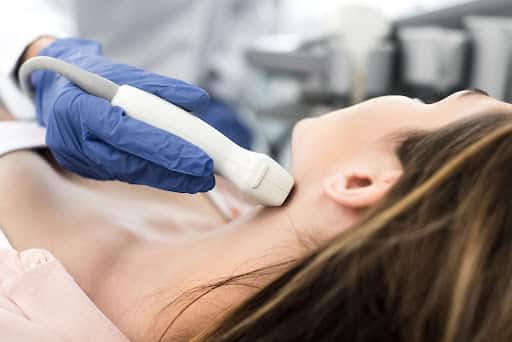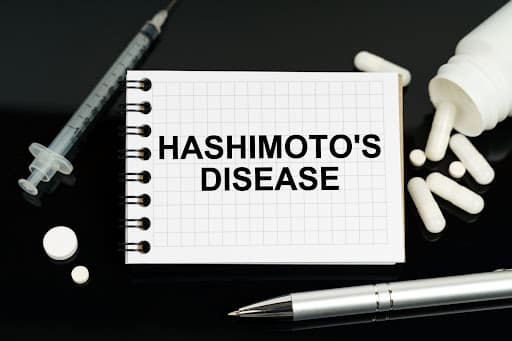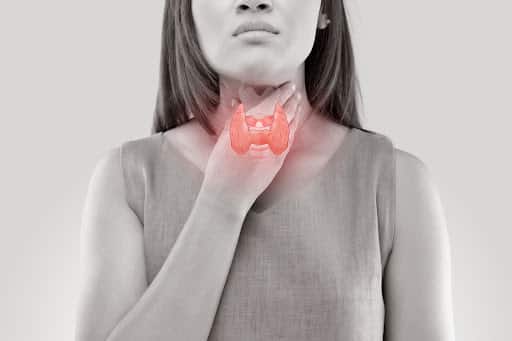The thyroid gland is one of the most crucial organs in our bodies located near Adam’s apple. It plays an important role in the body’s metabolism, growth, and development. By releasing hormones, it also regulates vital functions like:
- Breathing
- Muscle strength
- Heart rate
- Central and peripheral nervous systems
- Cholesterol level
- Body weight
- Menstrual cycles
- Etc.
The thyroid gland accomplishes all of this with two main hormones that it produces: Triiodothyronine (T3) and Thyroxine (T4).
To produce these hormones, the thyroid gland needs iodine, which is usually obtained through diet. The thyroid is one of the most easily damaged parts of our bodies and considering its crucial role for overall health, ensuring the healthy functioning of the thyroid is a must.
When T3 and T4 are released into the bloodstream, they can quickly travel to different parts of the body to regulate the speed of metabolism. Low levels of thyroid hormones can translate into lower metabolism, lower heart rate and higher weight. While high levels of T3 and T4 do the opposite. So, maintaining balance is extremely important for your overall health. In addition to T3 and T4, the thyroid also produces calcitonin which plays a role in bone metabolism.
Common thyroid disorders:
All current research indicates that untreated thyroid conditions increase the risk of chronic conditions. 1 in 5 people has a suboptimal thyroid that has not been detected. In Canada, around 10% of people over the age of 45 suffer from thyroid-related problems. Of those, as many as 50% are undiagnosed! Here’s a list of common thyroid disorders:
Hyperthyroidism
Our bodies are extremely sensitive to an imbalance in thyroid hormones, so it is no surprise that extreme growth or decrease in T3 and T4 levels has significant health implications. Hyperthyroidism (overactive thyroid gland disorder) is caused by excessive growth of T3 and T4. As a result, a person can develop symptoms like anxiety, irritability, nervousness, hyperactivity, sweating, sensitivity to high temperatures, shaking hands, light menstrual periods, unexplained weight loss. Women are much more likely to develop hyperthyroidism, especially pregnant women over 6 months. The risk also increases over the age of 60.
In some instances, the disease is simply caused by excessive consumption of iodine. However, there are other causes for hyperthyroidism, including Graves’ disease, thyroid nodules, the inappropriate dosage of thyroid hormone medicine, etc. According to Mayo Clinic, some of the serious complications of hyperthyroidism include health problems, an increase in risk of stroke and congestive heart failure.
Graves’ Disease
Graves’ disease is a common cause for hyperthyroidism. It is an autoimmune disorder, which means that your own body starts attacking the thyroid gland, making it produce an excessive amount of hormones. It’s not exactly clear why this autoimmune attack happens but it is known that the likelihood of Graves’ disease increases if you have a family history, vitiligo, type 1 diabetes, rheumatoid arthritis and consume nicotine.
Graves’ disease includes symptoms like anxiety, tremor in hands or fingers, weight loss, change in menstrual cycles, erectile dysfunction, fatigue, bulging eyes, heart palpitations, sleep disturbance. Prompt and accurate diagnosing of Graves’ disease is important for regulating thyroid function.
Hypothyroidism

Hypothyroidism is caused by a deficiency in T3 and T4, which causes thyroid gland to become underactive. It can cause trouble sleeping, tiredness and fatigue, memory problems, dry skin and hair, depression, frequent and heavy periods, joint pain and unexplained weight gain. It is diagnosed in approximately 5% of the population, with another 5% estimated to be undiagnosed. Older women have a higher chance of developing hypothyroidism. Also, there are several risk factors, including race (being white or Asian), age (peaking between 30 and 50 years), autoimmune disorders, etc.
Thyroid hormonal imbalance (hypothyroidism and hyperthyroidism) is one of the most common thyroid disorders diagnosed in humans. Untreated or inadequately treated hypothyroidism can lead to infertility, cardiovascular disease and mental health problems. At the Dempster Clinic we offer several tests for diagnosing thyroid-related diseases, including blood tests, thyroid scans, radioactive iodine uptake tests, etc. The treatment option will vary depending on the test results and individual patient factors like age, health, diet, etc.
Hashimoto’s disease: causes, consequences and treatment

When it comes to hypothyroidism, Hashimoto’s thyroiditis is the most common cause of thyroid failure. Hashimoto’s thyroiditis is an autoimmune disorder where the thyroid develops chronic inflammation and the body continuously attacks and destroys the thyroid gland. As a result, thyroid’s hormone-producing cells die and the production of T3 and T4 falls significantly, leading to hypothyroidism. Usually, Hashimoto’s thyroiditis progresses very slowly and its symptoms aren’t unique. So, a person might not suspect anything. If Hashimoto’s thyroiditis manages to damage thyroid cells and causes hypothyroidism, the symptoms become more pronounced and visible. Hashimoto’s can also lead to another thyroid condition called goiters if the inflammation enlarges the thyroid gland.
Lab tests play an important role in the early detection of the disease. Especially for people who are genetically predisposed or have a higher risk of developing thyroid problems. These risk factors include environmental triggers, like infections, stress and radiation exposure and others like sex, age, pregnancy, radiation exposure, etc. – common risk factors that are also present in case of hypothyroidism. Addressing this disease is important, as it can develop into more serious conditions, like heart problems (enlarged heart and irregular heartbeat), increase in bad cholesterol, mental disorders, irregular menstrual cycle and reproductive dysfunction, pregnancy-related problems, like higher risk of miscarriage or defects, etc.
Detection of Hashimoto’s disease can include both physical and laboratory testing. Blood tests will check not only the levels of T3 and T4, but also of thyroid-stimulating hormone (TSH), because it regulates hormone production in the thyroid gland. Antibody tests might also be administered to detect rogue antibodies that started attacking their own cells.
As for the treatment, it should be noted that Hashimoto’s doesn’t have a cure, but regulating hormone levels is still important and the treatment depends on the severity of the condition. In some cases, the doctor might decide to simply monitor the progression of the disease, however in case of severe hypothyroidism, medication and hormone replacement therapy (T3 or T4) are often prescribed. The goal of treatment is to restore an adequate level of hormones and improve the symptoms. Usually, the treatment and monitoring continue for life.
Other Thyroid Diseases
Goiter
Sometimes the thyroid gland itself grows in size, which is known as goiter. There are several types of goiters depending on how the thyroid grows. Diffuse goiter is when the entire gland enlarges, while nodular goiter happens when individual nodules start to grow. Thyroid growth can sometimes be seen with a simple neck check at home and it often points to iodine deficiency which can be easily verified and remedied. However, sometimes, thyroid growth can be a sign of more serious conditions, so it is important that you see a doctor. Additional tests might include an ultrasound, blood tests, biopsy, thyroid scan, etc.
Thyroid cancer
Thyroid cancer might start symptom-less, however as it develops it can cause swelling and pain in your throat. According to Mayo Clinic, the thyroid cancer rates are increasing, however most cases can be treated. As with other types of thyroid problems, risk factors include being a female.
Treating Thyroid Diseases at The Dempster Clinic - Center for Functional Medicine
While some people experience many symptoms, others are symptom-free which increases the chances of leaving the disease unattended.
So, how do we know if our thyroid needs a tune-up? Some signs that can point to thyroid problems include fatigue, digestion problems, skin/hair problems, depression/anxiety, menstrual irregularities and even fertility problems.
In addition, there are 6 critical tests you have to run to check the health of your thyroid:
- TSH
- Free T3 and Free T4
- Anti-TPO
- Anti-thyroglobulin
- Nutrient analysis (intracellular)
- Basal Body Temperature
These are ALL necessary to gain a complete understanding of your true thyroid function. Sadly, the average person only ends up having 1 or 2 of these tests run in their annual physical with their GP. Getting a thorough workup is always the very base of understanding how you can help support and heal.
The Dempster Clinic – Center for Functional Medicine provides state-of-the-art tests and diagnostics, collaborating with a number of world-leading laboratories to ensure the availability of a wide range of quality lab testing.



